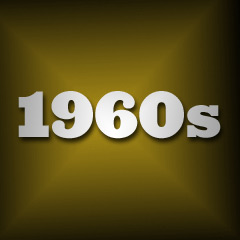
|
![]()
Greatest Films of the 1960s
1960 | 1961 | 1962 | 1963 | 1964 | 1965 | 1966 | 1967 | 1968 | 1969
Title Screen Film Genre(s), Title, Year, (Country), Length, Director, Description 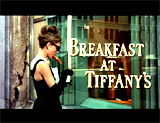

Breakfast at Tiffany's (1961), 115 minutes, D: Blake Edwards
Director Blake Edwards' 60s madcap comedy-drama was based upon Truman Capote's 1958 novella of the same name (adapted by George Axelrod). Its main character was naive, superficial, offbeat and eccentric society girl Holly Golightly (Audrey Hepburn), originally a child bride named Lula Mae Barnes (from the rural town of Tulip, TX), who lived in a cramped, one-bedroom apartment in a Manhattan brownstone on the East Side. Her implausible quirks included a tabby Cat (Orangey) with no name, a partially-furnished apartment, income derived from male escorts and from weekly "weather report" visits with a gangster named Sally Tomato (Alan Reed) in Sing Sing Prison, and mood swings (dubbed the "mean reds" as she explained: "The mean reds are horrible. Suddenly you're afraid and you don't know what you're afraid of"). She dispelled her fears and blues by visiting NYC's exclusive jewelry store Tiffany's. In the opening title sequence, the spirited and radiant New York call girl and gold-digging prostitute was wearing a sculpted black Givenchy evening gown and sunglasses while she stood outside the locked Tiffany's jewelry store on Fifth Avenue in Manhattan. In the early morning, she was window-shopping while eating her breakfast from a to-go white paper bag (coffee in a polystyrene cup and a dry pastry or croissant) after a night on the town. As usual, she forgot her front-door key when she returned to her apartment, and had to gain entry by notifying her annoyed, bucktoothed upstairs neighbor Mr. Yunioshi (Mickey Rooney in a decidedly racist and stereotyped role as a Japanese photographer). She was also acquainted with another neighbor: handsome aspiring writer (stuck in a rut with writer's block) Paul Varjak (George Peppard), who functioned as the 'kept man' of wealthy married 'decorator' Emily Eustace (nicknamed 2E) Failenson (Patricia Neal). In the memorable sequence of a wild cocktail party held in Holly's tiny apartment, Holly set the purple hat of a guest on fire with her long cigarette holder (while somebody else doused it with their drink). The simplest, most loved scene of the entire film was of Holly strumming a guitar and singing Johnny Mercer's Oscar-winning song "Moon River" on her fire escape landing. Holly also had to endure a visit from her ex-husband, Texan Doc Golightly (Buddy Ebsen), a horse doctor who incessantly called her Lula Mae. They had been married (now annulled) when she was only 15 years old. At a bus station as the broken-hearted Doc was finally departing, Holly explained why their love hadn't worked and why she wasn't going back with him to Texas. Afterwards, Holly spent a whole day with Paul on the town, as they experienced new and quirky things together (including a visit to Tiffany's, the public library, and to a local 5-10-25 store to engage in a shoplifting dare) - as they began to fall in love. As the film was winding down, Paul proposed marriage, but she stubbornly admitted instead that she was determined to marry José da Silva Pereira (Vilallonga), a wealthy South American (Brazilian) politician. [Note: It was revealed that Holly had been a courier of illegal drug information from gangster Tomato to his New York lawyer Mr. O'Shaunessy (Joseph J. Greene), causing Jose to drop Holly to protect his reputation.] In the film's final scene in a cab during a downpour, Holly stubbornly insisted to Paul that she was still intent on traveling to NYC's Idylwild Airport and flying to Brazil (even though Jose had decided to break up with her through a letter delivered by his cousin) - Paul read the letter outloud. And then with a cold-hearted decision, Holly abandoned her nameless Cat by letting it out the taxi's back door. Paul angriy lectured at Holly after ordering the cab to pull over and stop, and then left the cab to go find Cat. In the film's final moments, with a sudden change of heart, Holly exited the cab and ran back down the rain-soaked street, joyously located Cat, and was reunited with both Cat and Paul in an alleyway - she kissed Paul with the Cat squeezed in-between them - her last line: "Cat! Cat! Oh, Cat... ohh..."
The Exiles (1961), 72 minutes, D: Kent MacKenzie
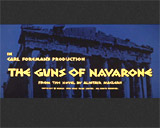



The Guns of Navarone (1961, UK), 157 minutes, D: J. Lee Thompson
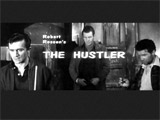

The Hustler (1961), 134 minutes, D: Robert Rossen
Director Robert Rossen's dramatic, realistic character study was based on Walter Tevis' novel. The film was reprised twenty-five years later, with Paul Newman as an older, wiser Eddie Felson in director Martin Scorsese's The Color of Money (1986). A young, arrogantly-cocky, anti-hero, pool-hall hustler, "Fast Eddie" Felson (Paul Newman), challenged acclaimed, cool, professional Minnesota Fats (Jackie Gleason) in Ames Billiards Room in New York City. The naive, talented, and ultimately self-destructive challenger lost. Defeated and self-pitying, he met and fell in love with another loner - alcoholic, desperate, waifish cripple Sarah Packard (Piper Laurie) - whom he ultimately forsook. He attracted the attention of slimy, calculating, venal, and repulsive promoter Bert Gordon (George C. Scott). With financial backing from the pimpish entrepreneur, Felson struggled to get back on top - at a great cost to his own self-esteem and soul.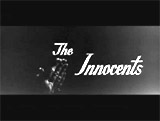


The Innocents (1961, UK), 99 minutes, D: Jack Clayton
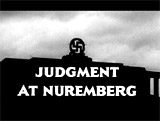


Judgment at Nuremberg (1961), 190 minutes, D: Stanley Kramer
During the Nuremberg war crime trials (which occurred during the post-war years from 1945-1949), crimes against humanity (Nazi atrocities) were prosecuted. Three years of trials had passed, and most of the major Nazis had been tried. There were four additional German judges who were brought to trial in 1948 - for using their offices to swear allegiance to Nazi policies, and conduct Nazi sterilization and cleansing policies. The main trial judge was retired American Dan Haywood (Spencer Tracy) in a three-man judiciary, while the defendants were represented by Hans Rolfe (Maximilian Schell), and the prosecutor was strident and vicious Colonel Tad Lawson (Richard Widmark), known for liberating the camps. One of the four defendants was well-reknowned author and professor Ernst Janning (Burt Lancaster), who objected to the trial altogether and remained silent. There were specifically two claims against Janning, who eventually testified under oath: (1) the Feldenstein case (Janning condemned elderly Jew Feldenstein to death for having sex with Irene Hoffman (Judy Garland), an Aryan, to abide by the Nazi's Racial Pollution law); and (2) the Petersen case (Janning had approved the sterilization of Rudolph Petersen, because he was 'feeble-minded'). Judge Haywood sentenced each of the four judges to life imprisonment, although the decision was not unanimous. As Rolfe predicted, none of those condemned to a sentence less than death at any of the Nuremberg trials was still serving their term just over a decade later. All of the judges were released within a few years.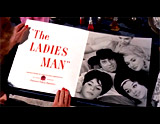
The Ladies Man (1961), 95 minutes, D: Jerry Lewis
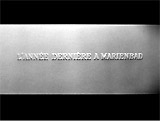
Last Year at Marienbad (1961, Fr./It.) (aka L'Annee Derniere a Marienbad), 94 minutes, D: Alain Resnais


Lola (1961, Fr./It.), 90 minutes, D: Jacques Demy
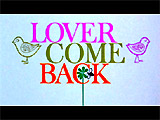

Lover Come Back (1961), 107 minutes, D: Delbert Mann
This vintage, second Doris Day-Rock Hudson lightweight satirical romantic comedy again featured two themes: mistaken identity and unexpected romance. The feature-length sitcom starred Hudson as playboyish, heaving-drinking Jerry Webster, ad executive of a Madison Avenue company working for incompetent boss Peter Ramsey (Tony Randall). Doris Day portrayed Carol Templeton, the prim new account ad executive at the rival firm of Brackett headed by Mr. John Brackett (Howard St. John). She was disgruntled with Webster for alleged unethical methods (including bribes, booze, and babes) to acquire a large key account from J. Paxton Miller (Jack Oakie). After she discovered that a new intoxicating product (fictional) known as "VIP" was being created by reclusive chemist Dr. Linus Tyler (Jack Kruschen), Carol was determined to win the account, but things became complicated when she mistakenly believed that Webster was "Dr. Tyler" and the two started to fall in love.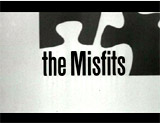

The Misfits (1961), 124 minutes, D: John Huston
Director John Huston's modern western drama was notable for being the last film of both Clark Gable and Marilyn Monroe (and co-star Thelma Ritter). It was derived from scriptwriter Arthur Miller's own novelette (appearing in 1957 in Esquire Magazine), and from Milller's first screenplay (written specifically for Miller's wife Marilyn Monroe at the time, during their rocky marriage). The themes of the introspective picture were the issues of loneliness and lack of communication, and the rugged individualism of modern-day Nevada cowboys who rounded up wild "misfit" mustang horses to be sold for dog food. There were five main characters in the 1960 Nevada desert (three were 'misfit' cowboys who had failed family relationships in their past lives), whose shifting interactions with each other formed the basis for the film: 30 year-old ex-stripper Roslyn Taber (Marilyn Monroe) - temporarily renting a place in Reno, NV after obtaining a divorce, her friendly landlady Isabelle Steers (Thelma Ritter), widowed ex-mechanic, tow-truck driver and war pilot-aviator Guido Racanelli (Eli Wallach), aging, old-school horse-wrangler and roper cowboy Gaylord "Gay" Langland (59 year-old Clark Gable - the name "Gay" was short for Gable), and death-defying rodeo bull- and bronc-riding drifter Perce Howland (Montgomery Clift). Roslyn and Gay were the first to immediately take a romantic interest in each other while temporarily living together in Guido's unfinished house, and she became his girlfriend, but both were wary of being emotionally-committed. When Gay, Guido and Roslyn were on a round-up of "misfit" mustangs for dog food (by Guido buzzing them with a biplane to exhaust and confuse the animals), Roslyn had an hysterical reaction after they had tied up one of the horses and talked about splitting up the money - she ran off into the open scorched earth and screamed at them: ("Horse killers! Killers! Murderers! You're liars! All of you, liars! You're only happy when you can see something die! Why don't you kill yourselves and be happy?! You and your God's country! Freedom! I pity you! You're three dear, sweet, dead men!...Butchers! Murderers! I pity you! You're three dead men!"). Her reaction caused Perce to defy Gay and release the captured horses, as Roslyn urged them to run off: ("Go home, go!"). After Gay's exhausting, one-on-one wrangling confrontation with the recaptured stallion leader of the wild herd of misfit horses, he did a surprising about-face and cut the rope to release the majestic animal after his assertion: ("Don't want nobody makin' up my mind for me, that's all. Damn 'em all! They changed it. Changed it all around. Smeared it all over with blood. Well, I'm finished with it. It's, it's like ropin' a dream now. Just gotta find another way to be alive, that's all. If there is one any more"). The film concluded with memorable (and poignant) closing lines as Gay and Roslyn, now reconciled to each other, rode back in his truck - Roslyn: ("How do you find your way back in the dark?") - Langland (pointing to the night-time sky): ("Just head for that big star, straight on. The highway's under it. It'll take us right home").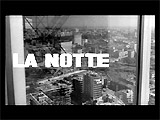

La Notte (1961, It./Fr.) (aka The Night), 115 minutes, D: Michelangelo Antonioni
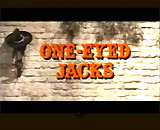

One-Eyed Jacks (1961), 141 minutes, D: Marlon Brando
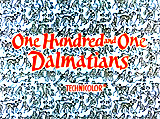

One Hundred and One Dalmatians (1961), 79 minutes, D: Disney Studio


One, Two, Three (1961), 115 minutes, D: Billy Wilder
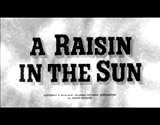
A Raisin in the Sun (1961), 128 minutes, D: Daniel Petrie
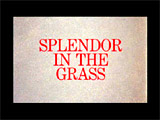


Splendor in the Grass (1961), 124 minutes, D: Elia Kazan
Elia Kazan's tragic, coming-of-age melodrama, set in the late 1920s and early 1930s in a small, rural Kansas town, was based upon Pulitzer Prize and Oscar-winning playwright William Inge's original, award-winning script. The title of the film and part of the story was derived from English romantic William Wordsworth's 1807 Ode, Intimations of Immortality from Reflections of Early Childhood, quoted here: "Though nothing can bring back the hour, Of splendor in the grass, of glory in the flower, We will grieve not, but rather find Strength in what remains behind." The controversial film (in its time) told a tale of repressed sexuality, imposed morality, love, and tragic heartbreak between two star-crossed sweethearts: HS senior Wilma Dean "Deanie" Loomis (Natalie Wood) from a poor family, and Bud Stamper (Warren Beatty in his film debut) from a rich and privileged background. They fell deeply and passionately in love. The teenagers were both tormented and repressed by the sexual mores of the time, their class differences, and disapproval from their parents - especially her prudish, puritanical mother (Audrey Christie) and his rigid, domineering and wealthy father Ace Stamper (Pat Hingle), and the couple was never able to consummate their intimate longings. "Good girl" Deanie's pent-up sexual feelings caused her to become hysterical in a memorable bathtub scene with her clueless mother. During their school prom, in the most dramatic and seductive scene, Deanie desperately begged for Bud to have sex with her, but he declined - increasing her frail mental state, and causing her to consider a suicidal drowning in the river. Repercussions caused Bud to chase after slutty girl Juanita Howard (Jan Norris), and then attend Yale due to his father's incessant demands, although his life changed when his father jumped from a hotel window with the advent of the Wall Street crash in 1929. Bud eventually was to marry a simple Italian girl named Angelina (Zohra Lampert), while Deanie was institutionalized in a sanatorium following a suicidal nervous breakdown and severe melancholia. After finding some semblance of peace, she was released and sought to reunite with Bud when she returned home. Her well-meaning father told her the location of Bud's run-down farmhouse and she set out with several girlfriends for a brief reunion visit. There, she learned that a very-much changed Bud was married to a lowly New Haven, CT waitress and already had one child with another on the way. The two seemed to come to an understanding and resolve their past feelings about each other, and Deanie also became reconciled to the way her life had ended up.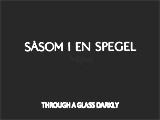
Through a Glass Darkly (1961, Swe.) (aka Sasom I En Spegel), 89 minutes, D: Ingmar Bergman.



Viridiana (1961, Sp./Mex.), 90 minutes, D: Luis Bunuel
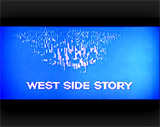

West Side Story (1961), 153 minutes, D: Robert Wise and Jerome Robbins
This energetically-choreographed, Best Picture-winning musical was loosely based on Shakespeare's tale of ill-fated lovers, Romeo and Juliet. The landmark, highly-honored, ground-breaking Broadway musical was transposed to the big screen and set on location in 1950s New York on the Upper West Side. It featured a memorable musical score from Leonard Bernstein and lyrics by Stephen Sondheim, including such popular songs as: "The Jet Song," "America," "Cool," "I Feel Pretty," "Something's Coming," "Tonight," "One Hand, One Heart," and "Maria." Two rival teenaged gangs, the Puerto Rican Sharks, led by Bernardo (George Chakiris) and the white Jets, led by Riff (Russ Tamblyn) rumbled with each other for turf on the sidewalks and streets of the city. Two young people on opposing sides, Polish Jet member Tony (Richard Beymer) and Bernardo's sister Maria (Natalie Wood) became 'star-crossed' lovers. His attempts at peace-making during a rumble accidentally led to the deaths of both gang leaders and further tragic circumstances in a tear-stained scene set on an outdoor basketball court.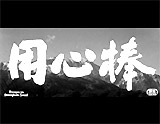


Yojimbo (1961, Jp.) (aka The Bodyguard), 110 minutes, D: Akira Kurosawa